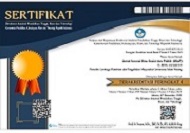Evaluation of regional government policies in handling post-earthquake disaster
DOI:
https://doi.org/10.33474/jisop.v6i1.21559Keywords:
evaluation, policy, local government, post-disasterAbstract
Disasters have had a huge impact both physically, psychologically and socially, the magnitude of the impact caused by these disasters means it is necessary to develop communities that have the ability to organize, learn and adapt in facing disasters. The aim of this research is to identify and describe the evaluation of the impact and behavior of the community on economic conditions after the earthquake disaster and to find out the local government's public policy in handling this case. Using qualitative methods with a case study approach, literature study, and secondary data processing from various social elements. Apart from that, data collection was carried out by interviewing sources who felt the direct impact of the earthquake disaster. The research results show that the impact of the post-earthquake disaster felt by the community is generally in the "severe" classification. The socio-economic conditions of the community cover several aspects, starting from geographical conditions that are in disaster-prone zones, health conditions are very worrying after the disaster. The conclusions of this research show that the consequences of the earthquake disaster are considered quite large, which has an impact on the regional economy. Damage to infrastructure combined with a backlog of logistics in supply warehouses means that goods that should be distributed cannot be carried out properly.
References
Agustino, L. (2016). Dasar-Dasar Kebijakan Publik. CV. Alfabeta.
Arent, E., Nasution, Thesalonika, E., Azis, F., Shofiyah, S., Jakob, J. C., Amzana, N., Trisnawati, S. N. I., Alam, S., Santoso, R., & Marlena, R. (2023). Metode Penelitian Kualitatif. Tahta Media Group.
Daswati, D., Samad, M. A., & Wekke, I. S. (2020). Collaborative Governance in the Management of Integrated Community Shelters Post Disaster (ICS) in the City of Palu. Politik Indonesia: Indonesian Political Science Review, 5(2), 229–242. https://doi.org/10.15294/ipsr.v5i2.21602
Fachrudin, R. (2015). Evaluasi Kebijakan Penanggulangan Kemiskinan Pemerintah Kota Balikpapan. Jurnal Ilmu Sosial Dan Ilmu Politik, 4(2), 1–12. https://doi.org/10.33366/jisip.v4i2.112
Gerungan, W. M. (2020). Penanggulangan Bencana Pada Tahap Pascabencana Menurut Undang-Undang Nomor 24 Tahun 2007 Tentang Penanggulangan Bencana. Lex Et Societatis, 7(9), 79–87. https://doi.org/10.35796/les.v7i9.27002
McKenzie, E., Prasad, B., & Kaloumaira, A. (2005). Economic Impact Of Natural Disasters On Volume 2 : Economic Assessment Tools. Australian Agency for International Development, 2(May), 102.
Modica, M., & Zoboli, R. (2016). Vulnerability, resilience, hazard, risk, damage, and loss: A socio-ecological framework for natural disaster analysis. Web Ecology, 16(1), 59–62. https://doi.org/10.5194/we-16-59-2016
Moleong, L. J. (2014). Metodologi Penelitian Kualitatif [edisi revisi]. Remaja Rosdakarya.
Muksin, Z., Rahim, A., Hermansyah, A., Samudra, A. A., & Satispi, E. (2023). Mitigasi Bencana Gempa Bumi di Cianjur. JIIP - Jurnal Ilmiah Ilmu Pendidikan, 6(4), 2486–2490. https://doi.org/10.54371/jiip.v6i4.1847
Pahleviannur. (2022). Metodologi Penelitian Kualitatif. Pradina Pustaka.
Pramono, R. (2016). Perspektif Sosiologis Dalam Penaggulangan Bencana. Jurnal Masyarakat Dan Budaya (JMB), 18(1), 81–96. https://doi.org/10.14203/jmb.v18i1.342
Prasetyo, D. E., Damrah, D., & Marjohan, M. (2018). Evaluasi Kebijakan Pemerintah Daerah dalam Pembinaan Prestasi Olahraga. Gelanggang Olahraga: Jurnal Pendidikan Jasmani Dan Olahraga (JPJO), 1(2), 32–41. https://doi.org/10.31539/jpjo.v1i2.132
Prihatin, R. B. (2018). Masyarakat Sadar Bencana : Disaster Awareness Society : Lesson Learned from Karo , Banjarnegara and Japan. Jurnal Masalah-Masalah Sosial, 9(2), 221–239. https://doi.org/10.22212/aspirasi.v7i1.1084
Rahim, A., Muksin, Z., Hermansyah, A., Azhari Aziz Samudra, & Satispi, E. (2023). Post-Disaster Mitigation Analysis In Cianjur. Brilliant International Journal Of Management And Tourism, 3(1), 120–130. https://doi.org/10.55606/bijmt.v3i1.1174
Rusydi, H., Effendi, R., & Rahmawati, R. (2017). Vulnerability zoning of earthquake disaster of Palu. International Journal of Science and Applied Science: Conference Series, 1(2), 137. https://doi.org/10.20961/ijsascs.v1i2.5138
Samad, A., Erdiansyah, E., & Wulandari, R. (2020). Evaluasi Kebijakan Pemerintah Pasca Bencana (Studi Kasus Bencana di Sulawesi Tengah). Publik (Jurnal Ilmu Administrasi), 9(1), 15–24. https://doi.org/10.31314/pjia.9.1.15-24.2020
Setiawan, A., & Pratitis, N. T. (2015). Religiusitas, Dukungan Sosial dan Resiliensi Korban Lumpur Lapindo Sidoarjo. Persona: Jurnal Psikologi Indonesia, 4(2), 137–144. https://doi.org/10.30996/persona.v4i02.555
Downloads
Published
How to Cite
Issue
Section
License
Copyright (c) 2024 Abdur Rahim, Andriansyah, Evi Satispi, Andi Hermansyah, Zainal Muksin

This work is licensed under a Creative Commons Attribution-ShareAlike 4.0 International License.
.


_-_Copy.jpg)





